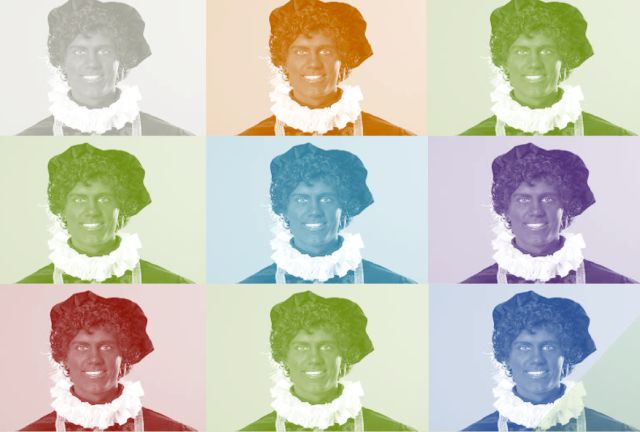‘There’s more at stake than the colour of Pete’s skin’
For the past few years, the arrival of saint Nicolas in the Netherlands has gone hand in hand with the discussion about Black Pete, especially now that protest group Majority Perspective has taken the matter to court. But is the court the right place for a discussion like this? Radboud Reflects organised a lecture today, about these and other questions.
Last week, Majority Perspective started summary proceedings against, among others, the NTR, the state and the city of Zaanstad. The goal was to strip Pete of all racist stereotypes during the arrival party. The black paint, golden earrings and stereotypical behaviours should be prohibited, according to the protest group. It was supposed to be an expression of racism and a violation of the UN Convention on the Rights of the Child.
Rogier Meijerink of Marjority Perspective told de Volkskrant that the news unchained a storm of angry reactions on social media against him and the protest group.
Skin colour
Major Bruls already told De Gelderlander that there’s no place for the announced demonstrations against Black Pete during the arrival in Nijmegen. This once again shows how the topic is discussed in society. But is this really something that need to be dealt with in court? And what can a judge do in a case like this? What is this discussion really about? Professor Jurisprucence Roel Schutgens and political philosopher Mathijs van de Sande answered these questions in a lunch lecture this afternoon.

‘I understand why the protest group decided to take this matter to court’, Van de Sande says before the lecture. ‘But it should not have come this far and it shows our government’s weakness. It is a shame that Rutte says that politics have nothing to do with this. By not taking a critical stand point as government, you don’t take the rights of this minority seriously. Even though the government is there to protect them.’
‘We have to acknowledge that the Netherlands still knows a great deal of inequality’
Van de Sande understands that politicians rather stay far from the matter: ‘Nobody wants to defend an unpopular opinion.’ But according to him, the discussion is about much more than just whether we should allow Black Pete to excist. It is about who decides what racism is and how we deal with our colonial past. Black Pete is just the symbol of this discussion.
‘That is the reason why people react so violently. They know that there is more at stake than Pete’s skin colour. It touches a painful nerve in our society. That is not fun, but we have to acknowledge that the Netherlands still knows a great deal of inequality.’
Public resources
Of course Van de Sande understands that most people probably don’t have racist intentions. He thinks that it’s more a question of who has the last word. ‘If a certain group says they feel something is a problem, you have to take that seriously. If the government does not acknowledge it, this minority has the right to take the matter to court.’
But he would rather see a different solution. It is his opinion that this is a job for public organisations, like municipalities. ‘Saint Nicolas’ arrival is organised with public resources. Because of that, everybody should be taken into account. These public organisations say they have nothing to do with the discussion, but with their policies, they disadvantage this minority.’




Piet Brown schreef op 16 november 2018 om 14:05
IMO, those who want to keep Black Piet black should start by defending the tradition against their fellow Dutch people who use “Black Piet” to insult others with a darker skin color. If “Black Piet” is not used as a racial slur, we foreigners would perhaps be less likely to associate “Black Piet” as racism.
White Pete schreef op 22 november 2018 om 16:18
Literally nobody uses “Zwarte Piet” as a racial slur…
AS schreef op 22 november 2018 om 17:07
Rotten apples at both sides ruin what should be a children’s feast. The discussion is inherently racist and is the driving force behind the association of Zwarte Piet with racism, even though the tradition itself is not racist in the historical, cultural or judicial sense (which this court will once again prove). The caricature should be abolished; but that is already the case for the vast majority of Zwarte Pieten, including those seen during the national arrival.
It’s easy to say that the silent majority should defend the tradition against both extremes, but not wanting to participate in the discussion is exactly that. We shouldn’t lower ourselves to the level of those despicable few that believe they have the right to block highways and make children cry with their slurs.
Anonimus schreef op 22 november 2018 om 15:10
For all people who believe this propaganda, because yes it is propaganda, maybe they should learn their own history – Black Piet is not connected with slavery and never has been, black Piet is black because of the coal – how does Sinterklaas arrive – on a steamboat, and what is used to fuel steamboat – coal right? Ok well, we can make an analogy with chimney sweepers – they also always have black faces, why because of the ashes, its nothing connected with race or skin color. And it has never been meant as a racism or insult or tolerance. Until people who desperately want attention try to portray it so.
Not to mention that the tradition of Sinterklaas has its roots way before the slavery years.
Proof – if you got to the Rijksmuseum and look at paintings connected with Sinterklass notice the years – way way way before the slave times.
So why should it nowadays a wonderful traditions that is meant to bring joy and happiness to children and adults be corrupted and ruined just because of it is interpreted wrong by people, who clearly do not want to see it for what it is – a holiday that brings joy, holiday that has never before (until last 6-7 years) been associated with racism and now certain people use such arguments against it for their own agenda’s.
Piet schreef op 22 november 2018 om 18:43
Hello my friend.
I understand your point. I came from a place with very high traditions related to beat woman, treat them as inferior, only as a servant. There people are working hard to change this tradition. So, in my opinion, just because something is a tradition, it doesn’t mean it is good. And traditions change across the time, because we as a society are also changing ourselves. Until some centuries ago it was okay to cut the arm of some black African if they don`t behave according your desire, today this is not acceptable anymore.
So now about “meant to bring joy and happiness to children and adults”. Yes, I agree! But at his moment of history, some people are saying that this tradition doesn’t make them happy, because they feel bad when they look at people painted 100% in black. If we want this tradition to be inclusive, it have to be happy for everybody, not only for white people.
Please, ask some black people how they feel about this topic. Talk to them.
lmgikke schreef op 23 november 2018 om 14:35
@Piet (you cannot reply to a reply, hence this way), you suggest to alter traditions based on feelings of others. People that want to change the tradition based on an interpretation that is not based on facts or truth. You post that the tradition should inclusive to all, not only white people. That statement is a farce. The whole point is that this is not a tradition based on skin colour. You suggest to exclude a big part of the people that are part of the current tradition, in order to include a group that acts on feelings instead of facts.
If you give in to that, you will find yourself no longer in a free society. See my comment further in this debate.
Anonimys schreef op 23 november 2018 om 16:01
@Piet, are you really comparing a cheerful smiling singing guy that gives people candy and presents to a tradition in the other end of the world that oppresses women? If that is the case then you clearly show where the issue is, its because people LIKE YOU are too blinded to see something beautiful for what really is, but instead seek attention to themselves and act like victims all the time.
P.S you DO not know the colour of my skin, but automatically assumed I am white, what does that say about you?
Or is it because you know that actually There are black people the ones with brains that understand this tradition for what it is and are ashamed of people like you that try to use it as an excuse for attention for other issues and blame the rest of the world, putting all of us in the same equation and category due to the actions of people like YOU.
LMG Ikke schreef op 22 november 2018 om 15:45
IMO this whole debate comes down to a debate about what freedom means. It is not an acknowledgement of inequality.
Because if we listen to the protesters against Black Piet, they propose inequality, by wanting prohibition.
Once you start prohibit things because a group feels offended, you start to create a non-free society. This gives not the right to insult or discriminate. It is very nicely put to words in this fragment: https://www.youtube.com/watch?v=OSc1_gfVfCc
Stroopwafel schreef op 22 november 2018 om 20:51
I think stroopwafelpiet is the way to go.
lmgikke schreef op 23 november 2018 om 14:49
@Piet. If feelings of unhappiness and inclusiveness in a tradition are arguments to alter a tradtion, then current debate shows that the tradition should stay how it always was.
The tensions in this debate show that a big group of people get unhappy feelings by the anti-black piet protestors. Those protests make a big group feel excluded. According to your logic own this means that the anti black piet protestors should stop their protest in order to take the feelings of the pro black piet protestors into account.
Especially when the arguments of the anti black piet protestors are based on feelings and not fact based.
Your other arguments about tradtions are non-arguments. e.g. your argument “I came from a place with very high traditions related to beat woman, treat them as inferior, only as a servant.” translated according to your own logic this means that women can ask any tv-show/film/theater production to be altered when a woman is portrayed as a servant. As it reminds them to being beaten and treated inferior.
Orthodox Masculist schreef op 24 november 2018 om 14:14
This perfectly fits the currently very prevalent political strategy of “being offended” by whatever it is that will give you more political power. Being offended about perceived (but non-existent) racism within the Sinterklaas tradition, being offended about “ladies and gentlemen” being used as an announcement in the train stations, being offended about literally any criticism of mass migration, being offended about everyone who dares to challenge the perpetually invented victimization of women in society.
I’ve also observed that what always happens is that people are forced to choose sides, so as to not be labeled a racist or a bigot. Clever blackmail, going hand in hand with the “being offended”.
Dean schreef op 25 november 2018 om 04:50
Sinterklaas as we call it here in Holland, was a hero of his time, removing the shackles of slavery from zwarte piet. The only slavery left was mental slavery, not knowing what to do with the freedom granted by their master, going back to their master because he gave them a better life then they could dream of (in that time). They were the first free niggers, historically celebrated, who knew that they were free to do whatever they like. They didnt know what to do, because their boss was no bad man and they never learned to think and take care for/of themselves.
Today we put our own shackles on, colored people as well as white people, fighting eachother while the companies without any owner in person get the slaves they want. They are laughing at the cage we build around ourselves as a victim of culture adjustment or racism.
Did anyone of these pro or against parties really get off the plantation? Looks like a lot of prisons build by the people who are fighting for freedom. “Ga terug naar de gevangenis zonder te betalen”.